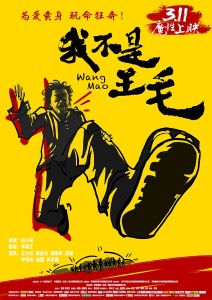Wang Mao
我不是王毛
China, 2014, b&w/colour, 2.35:1, 91 mins.
Director: Zhao Xiaoxi 赵小溪.
Rating: 7/10.
Modestly made but adventurous black comedy about a village innocent in the madness of war.
Shangqiu township, eastern Hebei province, central China, during the Sino-Japanese War. Gou Sheng (Wang Dazhi), the godson of Wang Daxing (Luo Jingmin), returns to his village in the wine-growing region of Helin, after 10 years studying martial arts at Shaolin Temple. During a welcome dinner, the locals are less than impressed by his martial arts display and Gou Sheng admits he just carried water during his time at Shaolin. However, he then splits the dinner table in two with one blow of his fist. With the Nationalist Army recruiting soldiers, Wang does a deal with Gou Sheng: if Gou Sheng takes the place of Wang’s actual son, Wang Mao (Tong Zhenjun), he’ll be allowed to marry Xinger (Ge Xiaofeng) if and when he returns alive. Gou Sheng signs up and leaves the 4 yuan recruitment money with his godmother (Su Li). Thanks to his special powers, Gou Sheng is to survive many battles against the Japanese, fighting for both the Nationalist Army and the Communist New Fourth army, while at home the township office’s director, Yang San (Guo Jinjie), plots to marry Xinger behind his back. And then the Japanese capture Shangqiu township.
REVIEW
The theme of an innocent caught up in the madness of war is not a new one in either western or eastern movies, but it is transformed into blackly comic cinema (with a dark twist at the end) in Wang Mao 我不是王毛. The major surprise is that the director is Zhao Xiaoxi 赵小溪, previously known for genre movies co-directed with his brother Zhao Xiao’ou 赵小鸥 – the suspense drama Invisible Connection 天上掉下个林妹妹 (2010) and last year’s above-average horror-murder mystery The Deadly Strands 咒•丝 (2013) – plus the horror movie Mysterious Face 枕边有张脸 (2013), directed on his own. Wang Mao shows him striking out in a completely different direction: a satirical drama, set during the Sino-Japanese War and shot almost entirely in black-and-white.
Written and co-produced by Li Haijiang 李海江, and set and shot in Li’s native wine-growing township of Shangqiu in eastern Henan province, the film follows a taciturn peasant, nicknamed Gou Sheng, who returns after being away for 10 years to study martial arts at Shaolin Monastery. When the Nationalist Army comes recruiting soldiers for the war against the invading Japanese, Gou Sheng’s adoptive father persuades him to take the place of his real son for a promise that Gou Sheng can marry the pretty Xinger if he returns alive. Gou Sheng does return alive – and as a hero – but then ends up as a soldier in the Communist New Fourth Army, where he also distinguishes himself in battle. Meanwhile, however, he finds that the township office’s director also has his eyes on marrying Xinger.
With its black-and-white photography, satirical tone and gruff northern types, the film recalls Devils on the Doorstep 鬼子来了 (2000) by Jiang Wen 姜文; and with its allegorical theme of an innocent northern peasant caught up in the ebb and flow of a war, it also recalls the black comedy Cow 斗牛 (2009) by Guan Hu 管虎. But Zhao, working with a much smaller cast and budget, gives the movie its own distinct and intimate flavour, with actor Wang Dazhi 王大治 (the village suitor in Bitter Love 哭恋, 2013) especially good as the blank-faced hero who has martial arts powers beyond even his own understanding.
The film turns very dark in its final section, which feels as if it was tacked on to the script. But in its satirical tone – and especially its portrait of the military, both Nationalist and Communist – it’s an especially adventurous production for the PLA-owned August First Studio beyond its usual war movies. The mobile widescreen photography by Wang Yan 王岩 – all in black-and-white apart from some scenes with spot red tints and a brief coda in full colour – conjures up an earthy look in village interiors, with much use of chiaroscuro lighting, and a brighter look in exteriors, with the war scenes having an almost abstract quality on a small budget. The film’s grisly, virulently anti-Japanese finale is out of kilter with the rest of the film.
The Chinese title actually means “I Am Not Wang Mao”, referring to Gou Sheng taking on the identity of his elder brother.
CREDITS
Presented by August First Film Studio (CN), Zhongshi Guowen (Beijing) (CN).
Script: Li Haijiang. Photography: Wang Yan. Editing: Wang Miao, Yang Qianxun. Music: Liu Sijun. Art direction: Xie Jun, Wang Pei. Costume design: Cui Xueli. Sound: Mao Jinling. Action: Jin Binlin. Executive director: Jin Binlin.
Cast: Wang Dazhi (Gou Sheng), Guo Jinjie (Yang San), Ge Xiaofeng (Xinger), Su Li (Wang Mao’s godmother), Luo Jingmin (Wang Daxing, Wang Mao’s godfather), Xu Jian (political instructor), Lin Yongjian (villager), Tong Zhenjun (Wang Mao).
Premiere: Shanghai Film Festival (Focus China: Chinese New Films), 15 Jun 2014.
Release: China, 11 Mar 2016.
(Review originally published on Film Business Asia, 20 Jun 2014.)
